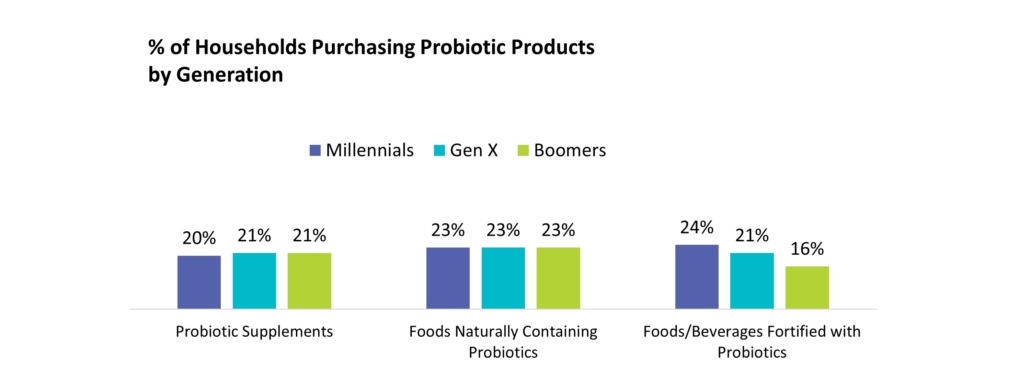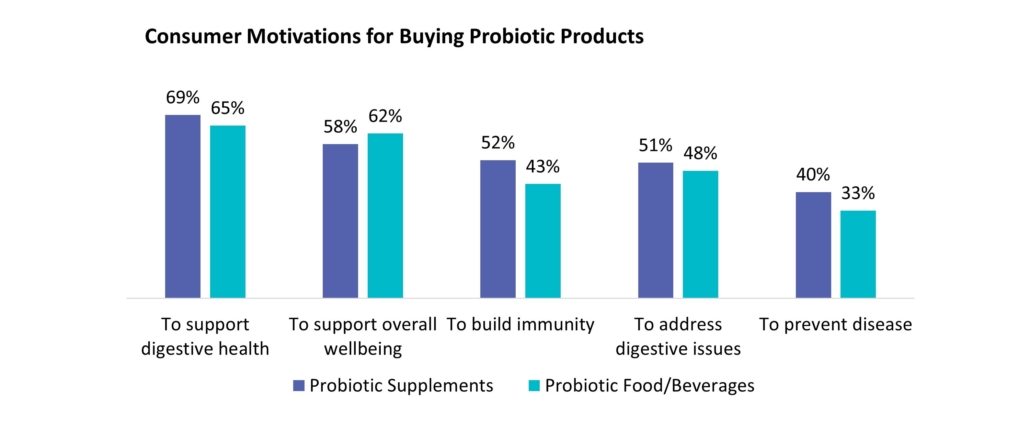As science continues to shed light on how critical it is to maintain a healthy digestive system, consumer interest in supporting gut health continues to grow. According to our latest survey, 87% of Americans agree there is a link between their digestive health and overall health and in turn, 70% of Americans report they are proactively supporting their digestive health through the foods they eat. In 2019, 36% of households reported they purchased a probiotic product (defined as a probiotic supplement or a food/beverage labeled as probiotic) in the past 6 months. Consumer interest continues to fuel the global probiotic category which, according to Grandview Research, is expected to grow at 6.9% CAGR through 2025. This blog provides insight on who is consuming probiotics, their motivations, and the top-ranking factors in making a probiotic product purchase.
THE PROBIOTIC CONSUMER
Probiotics products are popular among both genders, with a slight skew towards men (39% among men versus 34% among women), who are more likely to take probiotic supplements, specifically 23%, vs 19% for women. However, when it comes to consuming both probiotic supplements and food, women are more likely to consume both.
Probiotics products are also popular across generations, with over one-third of Millennials, Gen X, and Boomers reporting they have purchased supplements or food/beverages labeling as containing probiotics. Probiotic foods are more commonplace than supplements, driven by Millennials strong interest in foods fortified with probiotics.

Although probiotics purchase transcends age and gender demographics, those whose households buy probiotics are more likely to consider themselves knowledgeable about food and nutrition, indicating they do their research on the products they purchase. Buyers also significantly more likely to report they are managing a health condition, with the top three conditions reported being anxiety/stress (44%), overweight (43%), and high blood pressure (31%). This further demonstrates consumer understanding of the connection between probiotics, gut health, and health overall.
MOTIVATIONS FOR PROBIOTIC PURCHASES
Overall, the top motivations for purchasing probiotic products, in any form, are to support digestive health and overall wellbeing. Probiotic-labelled food/beverage buyers tend to focus more on overall wellbeing, while probiotic supplement buyers are more motivated to build immunity and prevent disease. This may reflect more active claims of immunity benefits offered by supplement brands’ packaging or advertising.

IMPORTANT FACTORS FOR PURCHASE
Probiotic Supplements
Nearly 55% of consumers who take probiotic supplements report taking them daily, so it’s not surprising that consumers rank price (57%), from a trusted brand (50%), and backed by a strong claim (46%) as the top factors when making a probiotic supplement purchase. These consumers have built a regimen and seek probiotic supplements that deliver both value and performance. When it comes more technical aspects of probiotic supplements, the number of active cultures and the strain of probiotic are important to about one-fourth of consumers, led by the Boomer generation which over indexes on ranking these factors as important.
Food/Beverages Labeled as Probiotic
Probiotic-labeled foods/beverages are consumed less often than supplements, with the majority of buying households consuming them a few times a week. Breakfast and lunch are the most popular occasions and the most important purchase factors include taste (63%), price (58%), and trusted brand (46%). The strain of probiotic and level of active cultures are less important among the probiotic food/beverage consumers than supplement buyers, with about 20% saying these factors are important to purchase. This is an indication that consumers buying food/beverages labeled as probiotic generally uphold their overall wellness focus and believe that any probiotic is a positive addition to their diet.
REACHING THE PROBIOTIC CONSUMER
Key consumer insights can help drive targeting and messaging strategy for brands seeking to capture a share of this marketplace. It’s important to keep in mind that consumers seek to elevate not only their digestive health but their overall well-being with probiotics. Claims that support these goals will resonate with consumers as well as products that provide the opportunity to integrate probiotics on more occasions.
If your business is looking for ways to innovate for or connect with the probiotic consumer, Linkage Research & Consulting has additional insights that can help to fuel your strategy. Contact us at info@linkageresearch.com.

 Linkage Research 2019
Linkage Research 2019 Linkage Research 2019
Linkage Research 2019